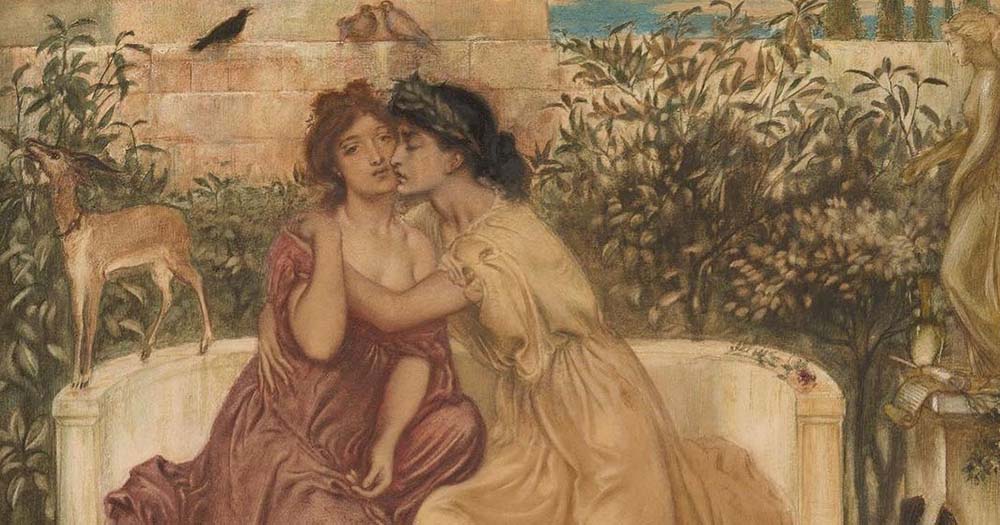While teaching a mythology course in 2021, Dr Tina Chronopoulos, Associate Professor of Middle Eastern and Ancient Mediterranean Studies at Binghamton University in New York, found herself identifying several ancient texts featuring stories that depicted LGBTQ+ themes like same-sex attraction and genderqueer identities outside of a male-female binary.
She said, “Students responded with such curiosity and excitement that I decided to create a stand-alone course that would focus exclusively on these topics.”
The course called ‘LGBTQ Antiquity: A View from the Mediterranean’ explores examples of same-sex attraction and genderqueer identities in ancient literary texts from the Mediterranean including Mesopotamia, Egypt, Greece and Roman Italy.
The labels that modern society uses to talk about gender and sexuality do not always align with ancient descriptions, but in all of the selected texts, authors describe relationships that can be said to fall under the LGBTQ+ umbrella.
View this post on Instagram
Instead of grouping each story by gender identity or sexuality themes, Dr Chronopoulos structures the class so that the texts are read in chronological order. She said this is useful because it lets students interact with the texts in a label-free way.
In terms of same-sex attraction, the course references several prominent figures from ancient Mediterranean mythology who may have been queer including the Greek gods Apollo and Zeus, who both loved other men, and Sappho, a queer poet from the Greek island of Lesbos in 600 BC. The word “lesbian” is derived from this Greek island since Sappho’s poetry proclaimed her love for women.
The course also describes love spells from Egypt through which women tried to convince other women to fall in love with them. The love spell originated from a small piece of papyrus written in Greek in which Herais daughter of Thermoutharin calls on gods to bind to her Sarapias daughter of Helen.
The course also references several examples of cross-dressing and gender variance that were seen as acceptable, including Byzantine saints who entered the monastery as women but transformed their bodies through extreme fasting until the community saw them as men.
Why do I do queer history?
Well, during #LGBTHM22 the quote that keeps coming back to me, making the hairs on the back of my neck stand on end, is by Ancient Greek poet Sappho:
‘Someone, I tell you, in another time will remember us…’ pic.twitter.com/HCskEFSxAJ
— Sacha Coward (@sacha_coward) February 10, 2022
When talking about her reason for developing a course about LGBTQ+ themes in ancient texts, Dr Chronopoulos described the increase in hate crimes and anti-LGBTQ+ legislation that queer people face today. She said she wants her students to feel validated and connected with the past, and learning about queer history is a valuable way to do that.
Dr Chronopoulos added, “My goal is for students to take courage and hope from knowing that same-sex relationships and gender diversity have existed in various guises for millennia.”
Congratulations to Professor Tina Chronopoulos of the Department of Classical and Near Eastern Studies @cnes_binghamton! She is the recipient of a prestigious SUNY Chancellor’s Award for Excellence in Teaching. pic.twitter.com/fwqevD7EpO
— Harpur College (@HarpurCollege) July 6, 2020
© 2024 GCN (Gay Community News). All rights reserved.
Support GCN
GCN is a free, vital resource for Ireland’s LGBTQ+ community since 1988.
GCN is a trading name of National LGBT Federation CLG, a registered charity - Charity Number: 20034580.
GCN relies on the generous support of the community and allies to sustain the crucial work that we do. Producing GCN is costly, and, in an industry which has been hugely impacted by rising costs, we need your support to help sustain and grow this vital resource.
Supporting GCN for as little as €1.99 per month will help us continue our work as Ireland’s free, independent LGBTQ+ media.
